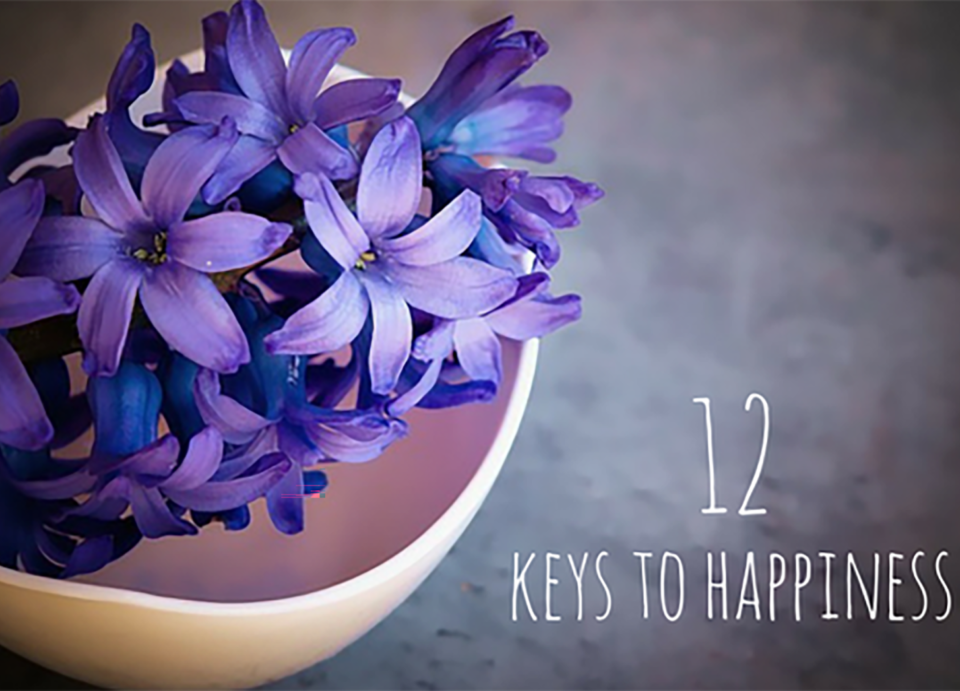12 Ways To Practice Happiness Daily


On a quest to achieve richer fulfillment in your life? While happiness may be relative, there are actions you can take every day to keep your mind positive and your body at its best. Here are 12 happiness activities to exercise daily, excerpted and adapted with permission from the book The How of Happiness by Sonja Lyubomirsky.
1. Express gratitude
 Bolsters self-esteem; encourages moral behavior; diminishes feelings of anger and bitterness.
Bolsters self-esteem; encourages moral behavior; diminishes feelings of anger and bitterness.
Strategies:
- Keep a gratitude journal.
- Express gratitude directly to someone else, either in person or by writing a letter that you can send or keep.
2. Cultivate optimism
 Prompts us to engage in active, effective coping; promotes positive moods.
Prompts us to engage in active, effective coping; promotes positive moods.
Strategies:
- Keep a “best possible self” diary; write down what you want for your future.
- Identify long-range goals, and break them into smaller subgoals.
3. Avoid overthinking and social comparisons
 Overthinking can sustain or worsen sadness; social comparisons can lead to feelings of insecurity and loss of self-esteem.
Overthinking can sustain or worsen sadness; social comparisons can lead to feelings of insecurity and loss of self-esteem.
Strategies:
- Embrace the big picture; ask yourself, Will this matter in a year?
- Write a list of situations that trigger your overthinking, and work to avoid them.
4. Practice acts of kindness
 Helps you to perceive others more positively; kindness jump-starts a cascade of positive social consequences.
Helps you to perceive others more positively; kindness jump-starts a cascade of positive social consequences.
Strategies:
- Make a list of kindness acts you intend to do, including how often and how much.
- Mix it up; vary your acts of kindness.
5. Nurture social relationships
 People with a strong social support network live longer.
People with a strong social support network live longer.
Strategies:
- Commit extra time to a partner or friend each week.
- Take delight in the success of the people close to you.
- Try to do one thing each week that supports your partner’s dreams or hobbies.
6. Develop healthy coping
 Coping alleviates hurt and stress; finding something positive in a negative experience can influence physical health for the good.
Coping alleviates hurt and stress; finding something positive in a negative experience can influence physical health for the good.
Strategies:
- Write your deepest thoughts about the most traumatic experience in your life; write for 15 minutes per day for several days in a row and notice any changes.
- Turn to a social support group in a time of strain, stress or trauma.
7. Learn to forgive
 People who forgive generally have higher self-esteem; forgiveness strengthens social relationships.
People who forgive generally have higher self-esteem; forgiveness strengthens social relationships.
Strategies:
- Recall a time when you did harm to another but they forgave you.
- Let go of your anger by writing a letter to the person who hurt you—but do not send it.
8. Increase flow experiences; be “in the moment”
 Flow provides a natural high; it’s inherently pleasurable and uplifting.
Flow provides a natural high; it’s inherently pleasurable and uplifting.
Strategies:
- Transform ordinary activities into something meaningful.
- Be open to new and different experiences.
9. Savor life’s joys
 Those who savor are more self-confident, extroverted and gratified; those who reminisce about the past are best able to buffer stress.
Those who savor are more self-confident, extroverted and gratified; those who reminisce about the past are best able to buffer stress.
Strategies:
- Take pleasure in the mundane activities of life.
- Replay happy days in your mind.
- Admire an object of beauty.
10. Commit to your goals
 Having meaningful goals increases self-esteem, provides structure and meaning to our lives, and helps us master use of our time.
Having meaningful goals increases self-esteem, provides structure and meaning to our lives, and helps us master use of our time.
Strategies:
- Contemplate the personal legacy you would like to leave.
- Believe in yourself.
- Be flexible; it opens your eyes and ears to new prospects and possibilities.
11. Practice religion or spirituality

Spiritual or religious practice makes up the single-most used form of coping.
Strategies:
- Dedicate time each day to prayer or meditation.
- Seek meaning and purpose in life.
12. Take care of your body
 Physical activity and acting like a happy person can both provide and enhance social contact.
Physical activity and acting like a happy person can both provide and enhance social contact.
Strategies:
- Start slowly; target 60–65 percent of your maximum heart rate.
- If you get off track, don’t beat yourself up or feel guilty—just start up again the next day.
- Smile. And laugh!